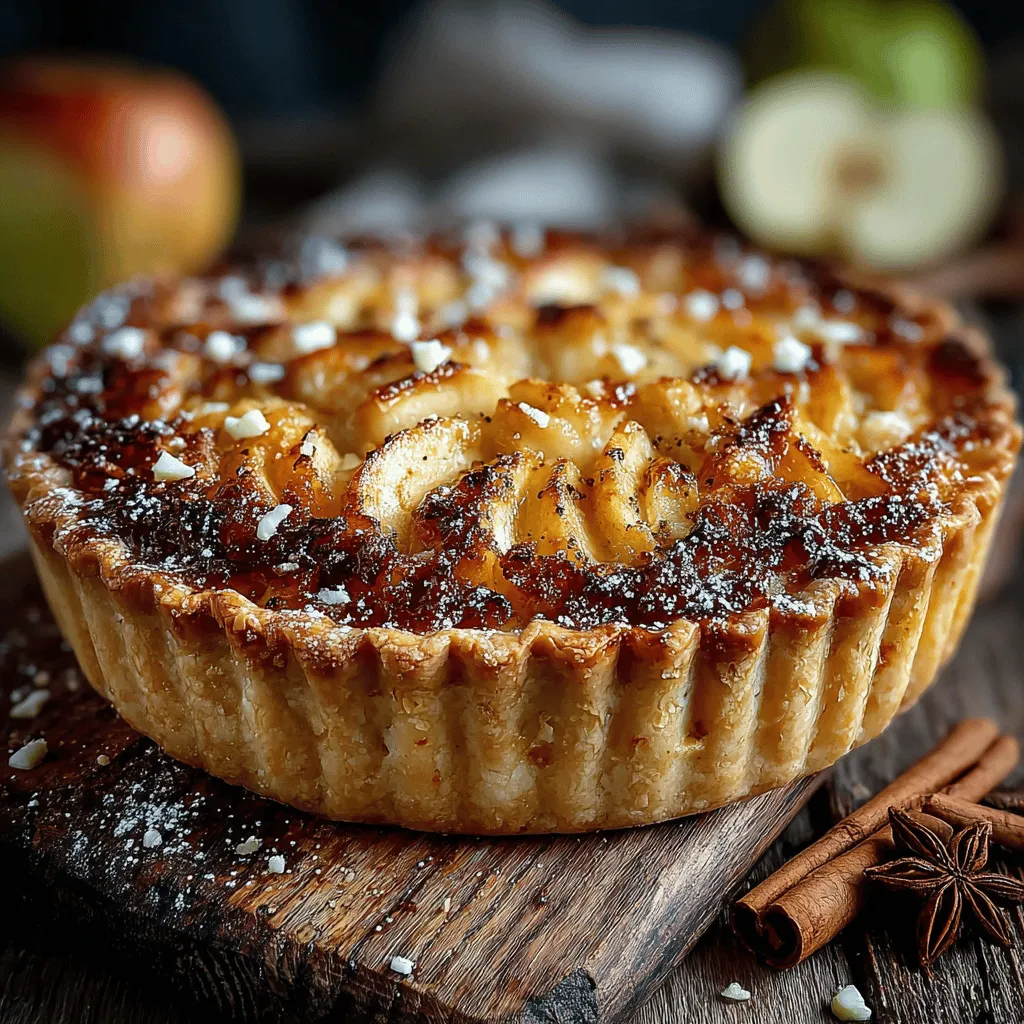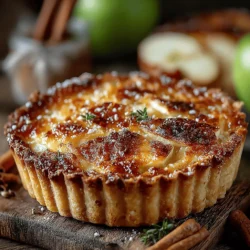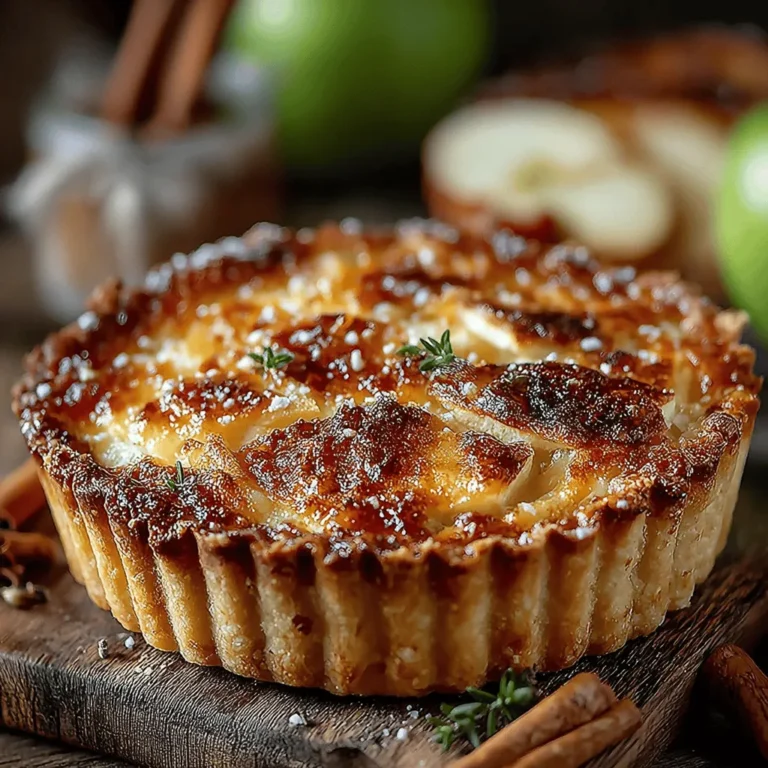Apple pie is a classic dessert that evokes feelings of warmth and nostalgia. Its appeal spans generations and cultures, often associated with family gatherings, holidays, and cherished memories of time spent in the kitchen. The aroma of a freshly baked apple pie wafting through the home can transport you back to moments spent with loved ones. In this post, we will share a detailed, easy-to-follow recipe for a delicious Timeless Apple Pie Delight that will not only satisfy your sweet tooth but also bring a slice of tradition to your table.
Ingredients
– 6 to 8 medium Granny Smith apples, peeled, cored, and sliced
– 1 cup granulated sugar
– 1/2 cup brown sugar, packed
– 1 tablespoon lemon juice
– 2 teaspoons ground cinnamon
– 1/4 teaspoon ground nutmeg
– 2 tablespoons all-purpose flour
– 1 tablespoon butter, cut into small pieces
– 1 homemade or store-bought pie crust (top and bottom)
– Pinch of salt
Instructions
1. Preheat your oven to 425°F (220°C).
2. In a large mixing bowl, combine the sliced Granny Smith apples, granulated sugar, brown sugar, lemon juice, ground cinnamon, ground nutmeg, flour, and salt. Toss until the apples are evenly coated.
3. Roll out the pie crust and lay it in a 9-inch pie pan, ensuring it fits snugly. Trim any excess crust hanging over the edges.
4. Pour the apple filling into the pie crust, spreading it evenly. Dot the filling with small pieces of butter.
5. Roll out the second pie crust and place it over the apple filling. Seal the edges by crimping them with your fingers or a fork. Cut slits in the top crust to allow steam to escape.
6. Bake the pie in the preheated oven for 15 minutes. Then, reduce the temperature to 350°F (175°C) and continue baking for an additional 35 to 45 minutes, or until the apples are tender and the crust is golden brown.
7. Remove the pie from the oven and let it cool on a wire rack before slicing and serving.
Understanding the Ingredients
When crafting the perfect apple pie, understanding the role of each ingredient is crucial to achieving a delightful balance of flavors and textures.
Granny Smith Apples
Granny Smith apples are the preferred choice for apple pies due to their perfect combination of tartness and firmness. Their ability to hold their shape during baking ensures that your pie will have a pleasing texture, while their tartness balances the sweetness of the sugars used in the filling.
The Role of Sugars
Granulated sugar adds sweetness to the filling, while brown sugar provides a deeper, caramel-like flavor. The combination of both sugars creates a well-rounded sweetness that complements the tartness of the apples.
Importance of Spices
Spices such as cinnamon and nutmeg are essential for enhancing the flavor of the apple filling. Cinnamon adds warmth and depth, while nutmeg introduces a hint of earthiness. Together, they create a comforting and inviting aroma that is characteristic of homemade apple pies.
The Function of Lemon Juice
Lemon juice not only enhances the flavor of the apples but also helps to prevent them from browning. It adds a subtle brightness that balances the sweetness of the sugars, making the overall filling more complex and enjoyable.
Flour as a Thickening Agent
Flour plays a vital role in thickening the apple filling as it bakes. It helps to absorb excess juices released by the apples, ensuring that the pie remains firm and sliceable.
Preparing the Perfect Pie Crust
A flaky, buttery crust is the foundation of any great apple pie. Below are step-by-step instructions for making a homemade pie crust, along with tips for achieving the ideal dough texture.
Essential Ingredients and Tools
To make the perfect pie crust, you will need:
– 2 1/2 cups all-purpose flour
– 1 teaspoon salt
– 1 tablespoon granulated sugar
– 1 cup unsalted butter, chilled and cut into small cubes
– 6 to 8 tablespoons ice water
– A large mixing bowl
– A rolling pin
– Plastic wrap
Tips for Achieving the Ideal Dough Texture
When making pie crust, it is essential to handle the dough as little as possible to prevent it from becoming tough. The key is to incorporate the butter into the flour until the mixture resembles coarse crumbs, leaving visible pieces of butter for flakiness.
Importance of Chilling the Dough
Once your dough is prepared, wrap it in plastic wrap and refrigerate it for at least one hour. Chilling the dough helps solidify the butter, which contributes to a flaky texture when baked.
Overview of Using Pre-Made Pie Crusts
Using a pre-made pie crust can save time and effort. Many brands offer high-quality options that can be found in grocery stores. Look for brands that use simple, wholesome ingredients to ensure the best flavor and texture for your pie.
Crafting the Apple Filling
The apple filling is the heart of your apple pie. Here are detailed instructions on selecting, peeling, coring, and slicing apples to ensure a delicious and visually appealing filling.
Techniques for Uniform Slices
To achieve even cooking, it is crucial to slice the apples uniformly. Use a sharp knife or an apple slicer to create slices that are approximately 1/4 inch thick. This will ensure that every bite of pie contains tender, flavorful apples.
Tips for Maximizing Flavor and Texture
To maximize the flavor and texture of your apple filling, consider mixing different varieties of apples in addition to Granny Smith, such as Honeycrisp or Fuji. This blend will enhance the complexity of flavors in your pie and provide a delightful contrast in textures.

Mixing the Filling
The Importance of Tossing the Filling Ingredients Thoroughly
When preparing the apple pie filling, it is essential to toss the ingredients thoroughly. This ensures that each apple slice is evenly coated with sugar, spices, and any additional flavorings you choose to add, such as lemon juice or vanilla extract. An even distribution of these ingredients will enhance the overall flavor profile of the pie and prevent any areas from becoming overly sweet or bland.
How to Adjust Sweetness and Spice Levels to Personal Preference
Apple varieties differ in sweetness, so it’s crucial to taste and adjust the sweetness and spice levels according to your preference. Start with the amount of sugar indicated in the recipe, but feel free to add more or less based on your taste. Additionally, spices like cinnamon and nutmeg can be adjusted to create a more personalized flavor. Don’t hesitate to experiment until you find the perfect balance that suits your palate.
Assembling the Pie
Techniques for Rolling Out the Pie Crust
Rolling out your pie crust may seem daunting, but with a few simple techniques, you can achieve a perfect crust. Ensure that your work surface is well-floured to prevent sticking. Use a rolling pin to gently flatten the dough, applying even pressure. Rotate the dough occasionally to maintain a circular shape and keep it from sticking to the surface.
Importance of Flourishing the Surface and the Dough
Flouring both the surface and the dough is vital to prevent tearing and sticking. A light dusting of flour will create a barrier that allows you to roll out the dough smoothly. If you find the dough sticking, sprinkle a little more flour as needed, but be cautious not to overdo it, as too much flour can lead to a dry crust.
Tips for Transferring the Crust to the Pie Dish Without Tearing
To transfer your rolled-out crust to the pie dish without tearing, use a rolling pin to help lift it. Gently roll the crust around the pin and then unroll it over the dish. If any areas do tear, simply patch them with excess dough. Remember, imperfections in the crust are part of the homemade charm.
How to Properly Mound the Filling to Prevent Collapse
When adding the apple filling to the crust, mound it slightly in the center. This helps create a dome shape, which is essential for preventing the filling from collapsing as it cooks. Overfilling can lead to spills, so ensure that the mound is generous but not overflowing.
The Purpose of Dotting with Butter and Its Impact on Flavor
Dotting the filling with butter before covering it with the top crust is a simple yet effective way to enhance the flavor. As the pie bakes, the butter melts and seeps into the filling, adding richness and depth to the overall taste. This step elevates your apple pie from good to extraordinary.
Baking the Pie
Detailed Baking Instructions
Baking your apple pie requires careful attention to temperature. Start by preheating your oven to a high temperature (around 425°F) to allow the crust to set and begin browning. After about 15-20 minutes, reduce the temperature to around 350°F to ensure the apples cook through without burning the crust.
Visual Cues for Determining Doneness
You’ll know your pie is ready when the filling is bubbling and the crust turns a beautiful golden color. These visual cues are reliable indicators that your pie has reached the perfect state.
Discussing the Cooling Process
Once your pie has finished baking, allow it to cool at room temperature for at least two hours. This cooling period is critical for the filling to set, making it easier to slice and serve. It also enhances the flavors as they meld together.
Tips for the Best Serving Temperature
While some prefer their apple pie warm, serving it at room temperature can often reveal more nuanced flavors. Experiment with both options to see which you prefer, and consider letting it sit for a few minutes after baking before serving.
Serving Suggestions
Describing the Ideal Presentation for the Apple Pie
For an appealing presentation, serve your apple pie on a rustic wooden board or elegant dessert plate. A simple dusting of powdered sugar can add a touch of elegance and make it visually enticing.
Serving Warm vs. Room Temperature
While warm apple pie is a classic comfort, room temperature pie allows the flavors to shine through. Offer both options for guests to choose from, making the experience more enjoyable.
Pairing Suggestions, Such as Vanilla Ice Cream or Whipped Cream
Enhance your apple pie with classic pairings like a scoop of vanilla ice cream or a dollop of freshly whipped cream. The creaminess balances the tartness of the apples and adds a delightful texture contrast.
Ideas for Garnishing the Pie for Special Occasions
For special occasions, consider garnishing your pie with a sprinkle of cinnamon, a few apple slices, or even a caramel drizzle to elevate its visual appeal and flavor. These small touches can make your dessert feel festive and unique.
Conclusion
Making and sharing a homemade apple pie is a joyful experience that brings warmth and comfort to any gathering. This classic dessert has a timeless charm that resonates across generations, creating cherished memories around the family table. We encourage you to try this recipe, experiment with your favorite flavors, and create your own lasting memories with this beloved dish.

